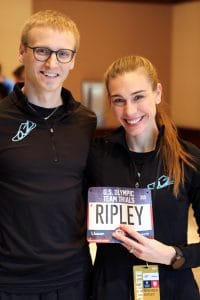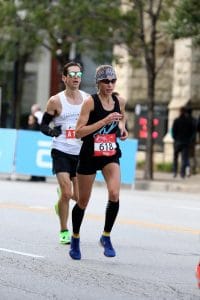Ah, the lies we mother runners tell ourselves. We often tell ourselves that our bodies are too broken or exhausted to do anything more than what is already demanded of us. But those thoughts are not only false; they’re also self-limiting. Just look at Andi Ripley, mom to two and co-founder of running website and podcast AtoZrunning.com which she operates with runner-husband Zach. After babies, Andi struggled with self-doubt. She felt like she couldn’t run fast or strong, or achieve her dream of qualifying for the U.S. Olympic Trials. But, she waged a war between her ears and won the battle–running fast and joyful, all the way through to the Olympic Trials in Atlanta this past February.
In her guest post, Andi shares how she battled common negative thoughts to victory:

Mind Games, Motherhood, and the Olympic Trials Marathon
It’s common to discuss positive thinking as athletes. We encourage our shared strength as women and mothers. It’s important. We are worthy. We are strong. It’s all true. Despite knowing all of this in my head, I battle with lurking darkness of self-doubt. Can you relate?
In this article, I reveal some lies I had to wrestle with on my journey to qualify and compete in the U.S. Olympic Trials Marathon. I don’t think I am alone in the mind games of motherhood and the marathon. I unpack actionable and conscious mental strategies I worked through to find my way first to the start as a qualifier and then to the finish line.
Related: How this mom qualified for the Olympic Trials running with a stroller
Lie: “I can’t run fast after babies.”
FALSE. Thank you to strong mother runners who have shattered this notion to help me through this mental barrier. Yes, it’s possible to run fast again. We can enjoy the speed and strength of our bodies, regardless of the time on the clock. Running fast post kiddos, or in any stage of life, can invigorate passion for running. There are a variety of distances to be run and I am also a proponent of celebrating decade personal bests as well. As mothers, we cannot allow for our motherhood to count out future successes in any endeavor. We need a lot of endurance and even more patience.
I ran my first marathon post-baby without putting any pressure on myself. I ran for the joy, stress-relief, and empowerment running gave me. I ran as slow as I wanted, pushed the jogger most days, and had to be flexible with schedules for the family, work, baby and me- all while listening to my body’s needs. Just over a year postpartum, I ran 2:55:22 in the marathon. I surprised myself.
Related: 15 Obstacles to exercise facing mother runners & how to overcome them

After the birth of my second son (I conceived right after my first marathon), I decided to train more diligently toward my secret goal of the Olympic Trials Marathon Qualifier of 2:45:00. Spoiler alert: I did it! I ran 2:43:45 at the 2019 Chicago Marathon. You can read the full recap here. I didn’t believe it was possible for a long time. Killing this lie took some time. It involved others speaking against my self-doubt. My husband told me I could do it over and over again. It took a long time to believe I could be that fast after babies. If it’s taking time for you to believe you can be fast again too, you are not alone.
Processing self-doubt, self-induced pressures, and misappropriated identity struggles were all part of this journey. Sure, I hit personal bests, but it was never a guarantee. The bigger success was feeling fast. Professional runner Leah O’Connor talks about feeling powerful again on our podcast. Her story helped shape this bigger vision than the numbers. It’s our can-do, limitless perspective that can help us overcome the lie that we cannot be fast.
Mental strategy: I let my body dictate my return, not the watch. I believed I could be fast and strove toward the satisfaction of speed, regardless of numbers.
Result: I am running lifetime bests after the birth of my second son as I am patient with myself and let go of the pressure to prove myself.
Lie: “I’m too tired.”
Have you ever felt serious mother runner fatigue? Of course, you have. It’s the weepy “I can’t do this anymore” deep down bone-tired weariness that comes with stretching ourselves to the very edge of sanity. Girl, I feel you. I have wanted to give up and hide from the world, preferably on a warm sofa with no screaming children or babies.
I have a theory that running tired gives mothers both a physical and mental edge. Think about it. You have to talk yourself into running when you’re exhausted, and in distance running, isn’t that exactly what you need to do in the final miles of a race? This scientific study concludes that you can talk yourself out of exhaustion during endurance performance. If we, as mothers must do this on a regular basis, wouldn’t it be logical to assume that we would more likely exercise this strategy come race day?
All this being said, take time for you. On occasion, sleeping is a better choice than a few extra weekly miles. Take care of yourself, mama!
Mental strategy: I am practicing overcoming exhaustion for race day.

Result: I don’t dismiss days that I am tired, I use them as an opportunity to practice running fatigued.
Related: Tips to stay motivated on your run
Lie: “I’m too weak.”
The difficulty with this lie is that it’s laced with truth. Our bodies go through a radical change to grow and deliver a tiny (or not so tiny) human. Postpartum, we have weaknesses that need to be addressed. In truth, we are not “too weak.” As we demonstrated to ourselves through the process of pregnancy, our bodies are resilient and remarkable. Our minds are stronger than ever and we have overcome adversity in likely our most physically fragile state.
Related: At-home strength training plan for runners
Overcoming this lie begins with embracing our “baby steps” (haha, isn’t that clever) toward strengthening the posterior chain and activating our glutes. We cannot throw ourselves into despair or denial.
After childbirth, I assumed I was simply out of shape and “weak.” I believed I just had to push through. Placing an identifier of being “weak” instead of seeing my potential for power caused me to have an ineffective approach. I ended up with hip labral tears in each hip due to impingement but also the stress caused by not activating my glutes. Please learn from my mistakes, and believe in your potential power instead of fighting against yourself. Here is a practical article with glute activation.
Mental Strategy: My current weakness is temporary and I am getting stronger. I believe in my potential for power.
Results: I was able to strengthen and rehab my hip labrum tears through physical therapy without surgery to both qualify for the Olympic Trials at the 2019 Chicago Marathon as well as complete the U.S. Olympic Trials Marathon.
Related: 6 strength training exercises for runners
Lie: “I don’t belong here.”
Have you ever felt unworthy? This lie isn’t exclusive to running. True confession: In life I find myself feeling I need to prove my worth and fall into despair when I feel I haven’t measured up. I struggled, am struggling, and continue to struggle (although pressing toward continuous improvement) with imposter syndrome. I am a work in progress. I know this is intense self-reflection, but can you think of a time you’ve been faced with a similar feeling? It’s ok to grapple with imposter syndrome as we admit, process, and move forward toward freedom from expectation and pressure.

As I lined up at the U.S. Olympic Trials Marathon, I was just me, Andi Ripley. I couldn’t change my training or be anyone else, and I had a sense of excitement and calm. As the race unfolded, I had sciatica and labrum pain on the hilly and difficult course. I put my pride aside, and focused on what I could control. I smiled, focused on my form, and enjoyed every moment knowing I will never get that moment back. I was there. I wasn’t an imposter. I was simply me, giving my best. This was not unlike difficult days during my regular daily grind. I was ready for a hard day, because I had pressed through many as a marathon mama.
Here is a deeper dive into an actionable process through anxiety and imposter syndrome.
Related: Overcome Imposter Syndrome
Mental Strategy: My identity and personhood are not measured by the clock, my place, my shape, or any person’s praise. I make goals that are within my control and let go of the things I can’t control. I belong. I am loved and created for a purpose.
Results: When I run with freedom, I run with joy. Often this liberation leads to being brave and unlocking my potential.
Do you feel more equipped for the mind games of motherhood and the marathon? You are not alone if you struggle to shake off these lies. Keep moving forward with a strategy to face the challenges with hope and perseverance.
Andi Ripley is the co-founder of atozrunning.com & the A to Z Running Podcast. She and her runner-hubby Zach Ripley share information about the world of running, inspiration to fuel passion and excellence, and ideas for connecting with and finding community. They also support runners through training services. Follow AtoZrunning on Instagram, Twitter, and Facebook at @atozrunning.

This is such a great article! Love all the tips. Whitney and Andi– you are both so inspiring!
Thank you so much for reading, Chelsea!